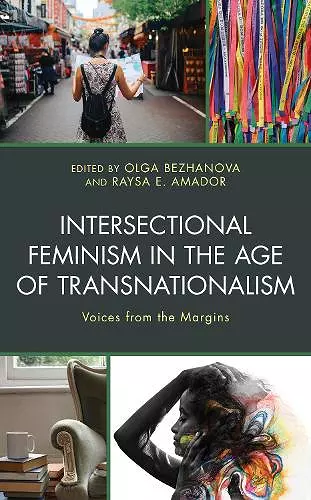Intersectional Feminism in the Age of Transnationalism
Voices from the Margins
Olga Bezhanova editor Raysa E Amador editor
Format:Paperback
Publisher:Lexington Books
Published:24th Aug '22
Currently unavailable, and unfortunately no date known when it will be back
This paperback is available in another edition too:
- Hardback£85.00(9781793619433)

Intersectional Feminism in the Age of Transnationalism: Voices from the Margins explores the limitations of the transnationalist approach to feminism and questions the neoliberal emphasis on individual freedom and consumer choice as the central goals of feminist activism. The contributions to the volume discuss such varied topics as fiction by Edwidge Dandicat, Judith Ortiz-Cofer, and Diamela Eltit; visual art of Laura Aguilar and Maruja Mallo; films directed by Lucrecia Martel; a TV series based on a novel by María Dueñas; the art-activism of Ani Ganzala and Zinha Franco; and the philosophical thought of Gloria Anzaldúa. All chapters proceed from the belief in the continued usefulness of intersectionality as a valuable category of critical analysis that is particularly necessary at the time when the effects of neoliberal globalization are undermining many familiar categories of critical inquiry.
Written during the COVID-19 pandemic by contributing authors who are at different stages of their academic careers, the volume critically engages with the impact of neoliberalism, globalization, and transnationalism in the Americas. The editors’ inclusion of female and feminist scholars who are immigrants to the US and others who reside abroad highlights multiple positionalities. This emphasizes an intersectional feminist framework of analysis attuned to power structures that produce structures of oppression based on notions of race, sexuality, socioeconomic class, citizenship, and ability. The book also provides a critical lens through which to study the ways in which neoliberalism has appropriated feminist discourses. Hence, this collection offers an important intervention in feminist as well as Latina/o/Hispanic studies by reaffirming the continued relevance of intersectional frameworks of analysis. Recommended. Advanced undergraduates through faculty.
* Choice *At a globally historic moment when many find ourselves forced to reconsider and reassess earlier narratives and scholarship related to feminism, activism, and the term transnational itself, a book like Intersectional Feminism in the Age of Transnationalism emerges as a timely and welcomed response. Combining genres and artists from a variety of geographies and eras, the work answers our questions while proposing others. Readers will appreciate this valuable collection. I know I did.
-- Margarite Fernandez Olmos, Professor of Spanish and Latin American literatures at Brooklyn College, City University of New YorkAlmost 50 years ago Pinochet’s coup d’etat imposed neoliberalism in Chile. “Freedom of the market,” the Chicago Boy’s mantra, was soon adopted by the neighboring dictatorships in the Southern Cone. In a Borgesian way neoliberalism has colonized much of the Western world. This original, interdisciplinary, intergenerational anthology sheds light on global neoliberalism from a transnational intersectional feminist approach.
-- Cynthia M. Tompkins, Professor, Latin American Cultural Production, Arizona State UniversityIntersectional Feminism in the Age of Transnationalism: Voices from the Margins is a vibrant collection of essays on the challenging subject of transnationalism. Each essay fully engages with complicated narratives that both express and empower transnational subjects. This volume will be of great use to scholars and students interested in the ways the concept of transnationalism can be integrated with intersectional feminism.
-- Susan Weisser, Adelphi UniversityIntersectional Feminism in the Age of Transnationalism: Voices from the Margins constitutes a fresh study of the effects of transnationalism and postmodernism on the "border female subject," all while challenging current views of gender, economic, and sociocultural politics. This book is required reading for all those studying and advocating for the construction of a new identity that identifies with a counterhegemonic discourse that entails transgression, difference, contradiction, subalternity, and liminality. The authors and the fictional works being selected are strategic and the book as a whole is a great contribution to the study of US Latinos and border studies.
-- Marta Boris Tarre, University of IdahoAmador and Bezhanova gather an eclectic and comprehensive collection of essays that portrays vividly the dialog among the scholars, analyzing works of fiction, philosophy, visual art, films, and TV from Spain and Latin American through the lens of transnationalism. The book declares untapped perspectives of the marginalized subjects, genders, races, and communities. As every scholar claims, the search for equality, inclusion, and the humanization of the marginalized voices implies an everyday struggle as a result of globalization and neoliberal collusion.
-- Jorge Rosario-Vélez, Long Island UniverISBN: 9781793619457
Dimensions: 230mm x 151mm x 15mm
Weight: 399g
242 pages